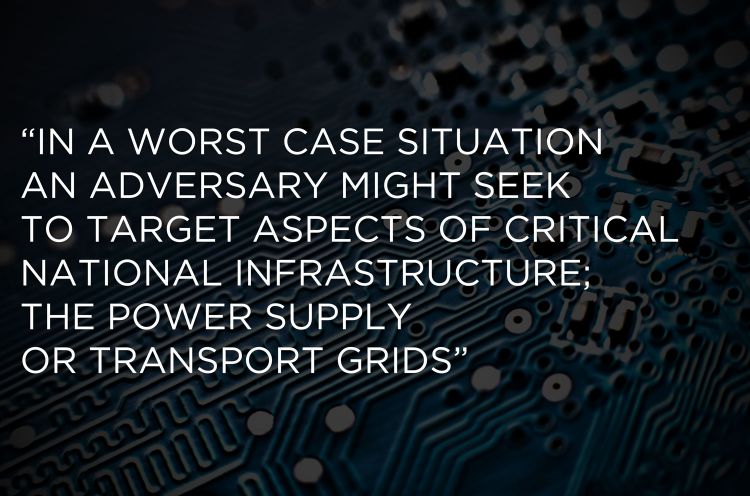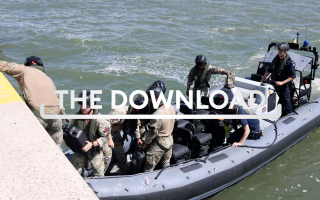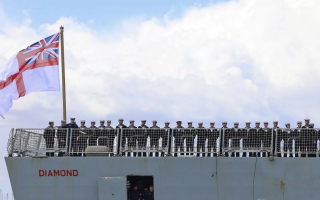Tri-Service
What Would A Cyber Attack On The UK Be Like?
More than a dozen countries are now thought to be capable of mounting major cyber attacks.
And according to new research released by think tank Chatham House, space and cyber technologies are in an 'escalatory cycle' of militarisation.
This, it is argued, leaves more advanced countries particularly vulnerable to attack from less well-developed states, as well as terrorist groups or other parties.
But what could happen if the UK came under attack? According to Nigel Inkster, Director of Transnational Threats and Political Risk at the International Institute for Strategic Studies, a leading think-tank which focuses on international security, the likelihood is high.
"Given the UK’s membership of the UN Security council, its network of international alliances and commitments and its tradition of an activist foreign and defence policy, the likelihood that at some point it might fall victim to a serious cyber attack... is high," Mr Inkster told me.
Cyber warfare has been described as "the use of hacking to conduct attacks on a target's strategic or tactical resources for the purposes of espionage or sabotage."
In the case of a cyber attack on a state, this could mean either trying to gain access to a country's classified information for one's own benefit, or attempting to directly damage or disrupt its infrastructure or resources.
Hackers might attempt to gain information on a wide range of areas - the designs of military machinery like tanks, boats or aeroplanes, equipment like guns, body armour, camouflage or ammunition, or troop movements, secret documents, plans and communiques.
Meanwhile, they might choose to damage or disrupt entities ranging from government websites or media outlets to transport links or public utility buildings like waterworks or nuclear power plants - or even less quantifiable commodities like public morale or a country's economy.
This is not hypothetical however - both types of attack have been carried out in recent years and have caused significant damage.
In 2007 the websites of Estonian organisations, including its parliament, banks, ministries, newspapers and broadcasters, were swamped or spammed amid a dispute between the nation and Russia.
A similar attack in Georgia in 2008 resulted in the country's parliament's website being replaced by images comparing president Mikheil Saakashvili to Adolf Hitler.
And as recently as 2013 both American Express and JP Morgan Chase were taken offline by cyber attacks.
Meanwhile, the well-publicised Sony Pictures Entertainment hack two months ago resulted in the release of confidential company information including personal data about its employees and their families, salary details of executives, private emails and unpublished films.
It led to the suspension of the release of the studio's film The Interview, which the hackers responsible had demanded be cancelled.
The UK does have measures in place for tackling cyber attacks, however. It takes them extremely seriously - and for good reason. The country is heavily cyber-dependent in areas as diverse as health, the military, education, the finance sector and its public utilities.
And so it comes as little surprise that the UK was one of the most supportive NATO members when the organisation pledged to advance its efforts to confront the cyber threats to its member nations in Autumn last year.
The government's National Cyber Security Programme, meanwhile, has had an £860 million budget to work with between April 2011 and March next year.
"The UK is particularly vulnerable to such attacks because it is a highly networked and open society with a high dependence of external connectivity and on foreign trade," Mr Inkster continued.
"In a worst-case situation an adversary might seek to target aspects of critical national infrastructure: the power supply, transport grids.
"A major disruption of the banking system [for example], would have significant implications for economic and social order.
"In the event of attacks of this kind the challenge will be for the government to orchestrate an effective response with the private sector which actually operates most of the networks that are vulnerable to disruption.
"The implications for the average man in the street of a major cyber attack might take some time to register. Some services such as transport links might come to an end very quickly.
"But the implications of a more general break-down - the inability to access money, the growing realisation that in any case there will soon be nothing to buy even if you have money, the lack of electric power or water and the lack of access to information will have a cumulative impact with uncertain consequences for social order."










